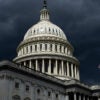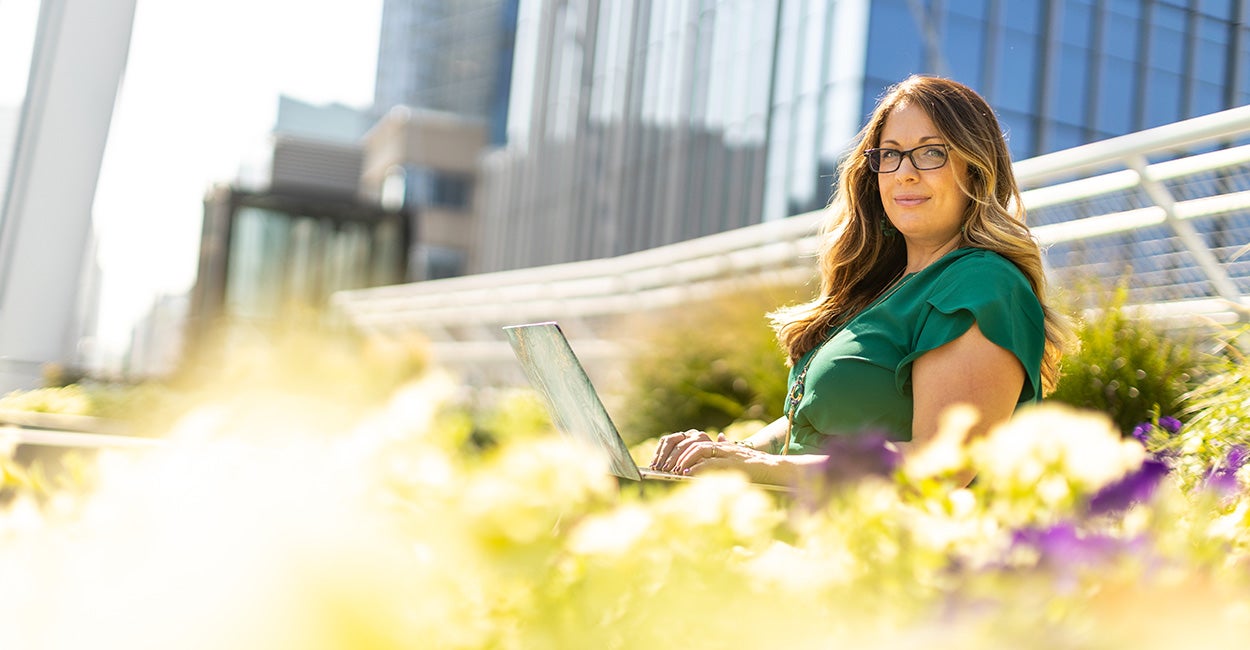Colorado graphic artist Lorie Smith doesn’t want to be forced to create wedding websites for same-sex couples.
“I’ve always been creative, I’ve always wanted to design for weddings, and I want to design and create for weddings in a way that’s consistent with God’s view of marriage,” Smith says.
Alliance Defending Freedom, a Christian legal organization, says Smith’s right to freedom of speech allows her to decline to create messages promoting homosexual marriage.
The Daily Signal depends on the support of readers like you. Donate now
The Supreme Court will hear arguments in Smith’s case Dec. 5.
Smith and her Alliance Defending Freedom attorney, Kellie Fiedorek, join “The Daily Signal Podcast” to discuss the case and how the nine justices may rule.
Listen to the podcast below or read the lightly edited transcript:
Virginia Allen: There is a law in Colorado that places businesses at risk of being forced to provide services for same-sex weddings. Lorie Smith is fighting that law at the Supreme Court and Lorie Smith and Alliance Defending Freedom attorney Kellie Fiedorek join us now to talk about this case. Kellie, Lorie, thank you-all so much for being here.
Lorie Smith: Thanks for having us.
Allen: Now, Lorie, you own and run your own graphic design business in Colorado, and you decided that you wanted to challenge this Colorado law that would require people like you, as a designer that runs your own business, to provide services specifically like a website for a same-sex wedding. Explain a little bit more about the situation and this law.
Smith: Well, the situation starts many, many years back. I’ve always been creative, I’ve always wanted to design for weddings, and I want to design and create for weddings in a way that’s consistent with God’s view of marriage. But Colorado won’t allow that. Colorado is censoring my speech and forcing me to communicate messages that violate my deeply held beliefs. I don’t believe anyone should be put in that position.
So several years ago, about six years ago, I realized after speaking with my pastor that I could be in a lot of trouble in the state of Colorado for creating consistent with my faith. And so that’s when I reached out to Alliance Defending Freedom. And they told me, in fact, “yes, you do have some things to be concerned about.”
And I prayed about it and determined that it was time for me to take a stand, not only for myself, but for all Americans. All Americans must be free to live and work in alignment with their deeply held beliefs without the government punishing some of us. So with a lot of prayer and consideration, I decided to stand for freedom.
Allen: Kellie, you work with Alliance Defending Freedom, who’s representing Lorie, and you-all have also represented Jack Phillips and the Masterpiece Cakeshop case in Colorado. Of course, Jack Phillips has been in and out of courtrooms for years now. What exactly are the similarities and the differences between his case and Lorie’s case?
Kellie Fiedorek: Well, I think the similarity is that Colorado, and in both cases, has forgotten that free speech is for everyone. They’ve engaged in a pattern of practice of unlawful censorship against Jack, and they’ve done the same thing against Lorie.
We won Jack’s case at the Supreme Court a few years back, and there the court said that Colorado had engaged in such a pattern of hostility toward Jack’s faith, toward his religious beliefs, and that was unlawful. They said that was impermissible, that the government needed to treat everyone equally.
So there, because the free exercise violations were so extreme, the court never reached the free speech component that they were also censoring and also violating Jack’s free speech rights. And as you know, Jack has remained in ongoing litigation now facing his third case.
So Lorie’s case is so important because here the Supreme Court has taken up the free speech case. They’re asking, the question before them is, can the government force artists, force Americans to speak something that goes against what they believe? And we’re very hopeful that the court will say, “No, they cannot. They have to respect everyone’s freedom to say what they believe without fear of government punishment.”
Allen: So if the court says that, if the Supreme Court rules in Lorie’s favor, will the Colorado law stand or will that ruling in turn strike that law down?
Fiedorek: Well, the law is being misused. So how Colorado is applying the law is the violation. So if the court rules for Lorie, that will protect her and other artists, both in Colorado and across the country and on all sides of the issue, it would protect a LGBT graphic designer as well, who doesn’t want to create art or websites that criticize same-sex marriage, for example. So a rule here would protect everyone and ensure that no government is able to use the law to violate free speech rights of its citizens.
Allen: So this would have a major impact on Jack Phillips as well and possibly many, many others who are fighting similar battles or looking to have to fight similar battles in the state of Colorado. But what about more broadly, how would this ruling, if the Supreme Court ruled in Lorie’s favor, how would that affect other similar cases across the country?
Fiedorek: Well, as I mentioned, I think a win here for Lorie would protect other artists. So we represent other artists in other countries or other states. We represent a photographer in Kentucky, a photographer in New York, and others. And there’s artists everywhere. I mean, it’s important, I think, for your listeners to know that a win here isn’t just for Lorie. It isn’t just for one small subset of the population. It’s for all of us because all of us have beliefs, we have viewpoints, and that’s what makes America unique.
What protects our free society is that ability to freely speak or to choose not to speak, and not to have to worry about what the government message is and what they want. Because winds change, political winds change, ideological winds change, but thankfully, the Constitution doesn’t, and that’s what allows us to have that free dialogue.
So whether you’re an atheist, whether you’re a person of faith, whether you’re a Democrat, whether you’re a Republican, whether you’re an LGBT graphic designer, whether you’re Lorie, we all should be able to freely say what we believe.
Allen: Lorie, this is a big case that you have said yes to and a big fight that you have said yes to. Why?
Smith: My first thought is, I go back to the right to speak freely is worthy of protecting. It’s worthy of protecting for myself, yes. But as I take a step back, I recognize that the implications of what the court will weigh in on here in several weeks impact so many. It impacts those that oppose my views on marriage. It impacts those that would agree with me. But the ruling in this case will also impact future generations.
I think about young people. I think about the former version of myself as a young girl working in my mom’s boutique in Colorado and watching her run a business and working hard to create something that they’re proud of, to work hard for that and to finally achieve it only to be told by the government, “You can’t do that because your views don’t align with ours.”
So I took a stand because no one should be put in a place of having to be backed in a corner simply because the government doesn’t agree with their viewpoint. So yes, it’s for me, it’s for those who may not hold the same views, but it’s also for those who will follow the steps as a designer one day or a young entrepreneur, it’s for them as well.
Allen: How has this journey been for you and your husband so far as you have gone from just being small-business owners in Colorado to all of a sudden, “OK, we’re we’re going to take on the state and we’re going to take it all the way to the Supreme Court”?
Smith: Yeah. This has certainly been a rollercoaster ride that we’re going on about, what, six years now. And when it’s said and done, we’ll be closer to seven. It has certainly been a journey and there have been a lot of hills and valleys.
When I first filed, I was not prepared for the amount of backlash that I would receive. And in the years that have followed, I’ve received death threats, and threats of physical harm, and some really specific just nasty things as well. But my business has been harmed. I haven’t been able to do what I want to do. I want to create and design for weddings and I want to do that consistent with what my faith teaches me about that relationship. I’m not allowed to do that.
If that weren’t bad enough, my family has endured this with me. We have a security system on our home, and my clients have been threatened, people are constantly trying to take down my website, all because I love Jesus Christ and I want to create consistently with what my faith teaches me. So it has been a rollercoaster.
There have been moments that have been really trying, but the thing that’s pulled me through, in addition to the incredible people at Alliance Defending Freedom, are those that have emailed me through my website and said things like, “I’m so grateful. I wish I could take a stand like you have.” Or, “I’m also a designer. While I don’t agree with you on this topic, I see it’s important.”
Those messages of support, I’ve received cards and a number of people just continuing to lift me in prayer, that has carried me over the last six years. But I am incredibly grateful for what’s coming in the coming weeks and certainly hold hope that the court will rule in favor of me and in favor of all, really.
Fiedorek: And that’s something I just love about Lorie and her case, is just her love for people. I think sometimes we hear people have different viewpoints, but Lorie serves everyone. It doesn’t matter who they are. She has clients that identify as LGBT all across the spectrum. For her, like most artists, it really just comes down to, what is she being asked to create? What is that message?
And I love that because it’s, for her, it’s never about who the person is. It’s always about, what are they asking her to create? What are they asking her to promote? And I think that’s something, as she was relating, regardless of where we stand on the issues or whether we agree on everything, we’re starting to see, I think, a growing sense of support that even though we might disagree, we can agree that we should all be free to speak and to speak freely.
Allen: Now, we know that the Supreme Court has announced they’re going to hear this case at the beginning of December. Talk a little bit about what specifically you’re asking the Supreme Court and what you think we can expect from the justices.
Fiedorek: Well, that’s right. We just found out that the arguments will be on Dec. 5. So we’re very much looking forward to that. And what we’re asking the court to do is to affirm what they’ve affirmed before. And that is that free speech protects every American’s ability to speak freely, to create freely.
The government shouldn’t be able to censor or coerce anyone to say something that they don’t believe. This is a bedrock principle. It’s deeply rooted in the Constitution. The Supreme Court, time and time again, has affirmed that principle, even affirming it when there’s been speech that maybe it might offend someone, maybe it is in the minority. But even then, that’s when the court has said, “Those are the times we really want to step in and protect this because all speech is worth protecting.”
And when the government puts its finger on the scales and says, “Well, here we’ll protect this speech because we’re OK and we like it, but here won’t,” that’s a very frightening place to be for all of us. So we’re very hopeful that the Supreme Court will affirm this. We’re very optimistic that they will affirm free speech in Lorie’s case and that will benefit countless generations.
Allen: Lorie, for you, if this ruling ultimately comes down in your favor, what do you think you’re going to feel in that moment?
Smith: I think it’s really hard to put myself in that place only because it’s been such a long journey, but I don’t know. I don’t even know that I can articulate it in words. I have been on this journey for a long time and it’s important to me that I continue and the most important thing is that God’s will be done. So I’m certainly praying for a victory because I know it’s not just a victory for myself, but for so many. So I don’t know. We might have to have that conversation when a ruling comes out and I’ll let you know.
Allen: We’d love to have you back when it happens. Now, Kellie, it’s impossible to be able to predict how exactly the justices will rule, but what do you expect from them?
Fiedorek: I’m going to start that over again. I’m optimistic that we will see a very strong ruling. This case is pretty clear-cut. What Colorado’s doing, is asking for is unprecedented. And the Supreme Court has, time and time again, affirmed government cannot force any American to say something they don’t believe. Certainly can’t do it and force them, threaten them with punishment if they don’t. So certainly optimistic.
I would love to see a very strong ruling. I wish I could read the tea leaves. You never know with the Supreme Court. But on an issue as clear-cut as this with free speech, we’re certainly very optimistic to see a very strong ruling in favor of Lorie.
Allen: Lorie Smith, Kellie Fiedorek, thank you both so much for your time today. We’ll be continuing to watch this case, 303 Creative, move forward at the Supreme Court. Thank you both for your time.
Smith: Thank you so much for having us.
Have an opinion about this article? To sound off, please email letters@DailySignal.com and we’ll consider publishing your edited remarks in our regular “We Hear You” feature. Remember to include the URL or headline of the article plus your name and town and/or state.
































